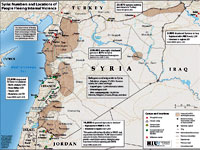Syria: the bad guys and the bad guys

(Moscow News – Anna Arutunyan, Correspondent and Editor at themoscownews.com – June 24, 2013) In the geopolitical drama over the ongoing Syrian civil war, Russia’s position, on the surface, appears to be clear as glass. Of course Russia’s backing Syrian authoritarian leader Bashar al Assad, the narrative goes – it fears a similar uprising back home.
Actually, the Kremlin’s stance can be better explained by a very banal understanding of the way the world works. It’s an understanding that politicians in the United States seem, to their long-term detriment, to have forgotten: there are no good guys and bad guys in a civil war.
President Vladimir Putin hinted as much when he cited an incident in which a Syrian rebel was videotaped eating the heart of a dead soldier.
“One does not really need to support people who not only kill their enemies, but open up their bodies and eat their internal organs in front of the public and cameras,” Putin said. “You want to supply weapons to these people? But then that, apparently, has nothing to do with the humanitarian values that Europe has upheld for hundreds of years.”
Of course, Russia’s Kremlin is not above getting into the fray of someone else’s politics to score points, nor is it above playing geopolitical games to the detriment of its own citizens, as last year’s American adoption ban showed us. And as for whistleblowers such as Edward Snowden, Russia would gladly back them – if and when it suits the Kremlin.
In the case of Syria, Russia may be guilty of pragmatic cynicism (by continuing to supply lethal S-300 missiles to Assad’s regime), but it has largely avoided putting itself into a potentially disastrous position of having to take responsibility when a “democratically”-elected government falls apart or turns extremist.
There’s a reason Russia understands the dangers of picking sides in someone else’s civil war. Russia’s history, in many respects, is one long, cold, civil war between its people and its government.
Whenever it flared up, Western regimes would inevitably move in to back a side: cynically, as in the case of the Germans providing Vladimir Lenin safe passage (purportedly to help him shake things up enough for Russia to get out of World War I), and foolhardily: as when Americans backed Boris Yeltsin’s lethal attack on his own parliament in 1993.
It was at least clear what the Germans were trying to achieve back in 1917. I have yet to see any value emerging from so many seemingly intelligent grown men in the West getting behind a measure that basically ended whatever chances Russia had at democracy anytime soon.
What is really disastrous is militarily backing a rebel cause in the name of democracy, something that the United States appears to have decided on as a matter of policy. I wish there was some cynically pragmatic explanation for it, but I can’t seem to find one.
The United States backed the opposition in Libya in 2011, and the civil war ended with dictator Muammar Gaddafi’s dead body being paraded in the street. Today, the authorities in Libya are about to hand down the death penalty to two politicians over election posters that depicted men discussing the role of women in Libyan society. If the U.S. government prefers to do business with folks like that, then I can only wish us all luck.
The problem lies in a misreading of the structure of popular uprisings in the Arab world – and in authoritarian regimes in general. If a popular uprising threatens a particular government, that’s not evidence of a budding democracy, but lack thereof.
Popular uprisings show that there are no democratic mechanisms for regime change aside from the use of force. The people who initially take to the streets might be democratically-minded, but they are not the ones who are ultimately going to take power.
It’s bad guys with guns who usually take the place of a deposed dictator – and when push comes to shove, they are hardly above their predecessor’s methods for dealing with dissent.
1685 Mccomb Ave, Porterville, CA 93257
